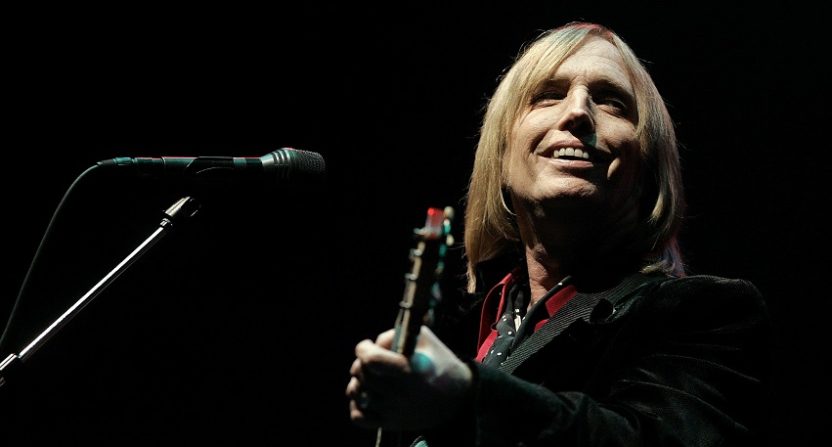Many years ago when I worked at a now-defunct bookstore chain, I often bought some music on payday. Kind of a treat to myself. Something to listen to in the car on the way to wherever I was going next. I distinctly remember the time I picked up Long After Dark, which was probably the one Tom Petty and the Heartbreakers album I didn’t have in my collection.
My co-worker working the register was a big music fan. His entire life was seemingly built around going to live music shows. Though we didn’t have the same tastes, we often talked about current music as a shared interest. When I slid the CD across the counter to him, he looked at, then looked back up at me with a mixture of surprise and disapproval. I could almost hear his face speak. “Tom Petty? That’s what you’re buying? Ugh.”
I saw his expression and pointed at him. “Hey man, Tom Petty is a great fuckin’ rock star.” He chuckled and nodded. I was probably over-defensive. He could’ve laughed in my face. Maybe I wanted my taste in music to be seen as cool by this guy. But I was also disappointed in him. Tom Petty is a great fuckin’ rock star. And along with him, the Heartbreakers are one of the best rock bands, far too underrated. I got in my car and blasted the album on my way home.
Long After Dark isn’t one of Petty’s best albums, though there are two standout tracks: “You Got Lucky” and “Change of Heart.” Released in 1982, it may actually be one of Petty’s most dated works. The album cover screams 1980s and “You Got Lucky” is driven by synthesizers, something not typically associated with Petty’s music. I think that’s exactly why it’s one of his most interesting songs. It’s somber and a little bit angry, telling an ex-girlfriend that she’ll never find somebody better than him.
As a kid who grew up as a sci-fi and comic book geek, I also enjoyed the post-apocalyptic video (with a clip from the original Battlestar Galactica on a TV) for “You Got Lucky.” (Petty kind of reprised this role in 1997’s The Postman with Kevin Costner.) As Sean Keeley wrote here at The Comeback, Petty was an unlikely video music star, showing a sense of humor rare among his peers and creating some of the best examples of the form. He became a rock icon because of it.
When I saw the news of Tom Petty’s death (which was initially premature, and surely made the rocker who wrote “The Waiting” smile devilishly), I knew I wanted to write something. I’m a writer who largely focuses on pop culture here. Many of us have that one artist or group whom we’ve seen in concert more than any other, sometimes going to other cities to see them perform multiple times on tour. For me, Petty was that guy, my favorite musician.
But where to begin? Music seems like such a difficult thing to write about, and I greatly admire those who do it well. How do you describe what makes a musician great? Songwriting, melody, approach, distinct sound? (Roger McGuinn and The Byrds were clearly an influence.) Petty checks off all of those boxes with memorable lyrics and songs immediately recognizable within the first couple of notes. Was his artistic vision uncompromised? He felt so strongly about his music that he once broke his hand after punching a wall in frustration during the record of Southern Accents.
Rock stars are often to be celebrated for taking a stand, for opposing authority. Petty did that most famously in 1981 when he fought his record label over the sale price for his album Hard Promises (which included “The Waiting” and “A Woman in Love”). MCA wanted to sell it for $9.98, but Petty balked at the extra one dollar charge that would have made his album one of the highest priced on the racks. He won that battle, and earned lifelong devotion from so many of his fans in the process. Stick it to the man.
But in the midst of mourning during the past 24 hours, Petty has also made me feel like an inferior writer. My mother asked me this morning what made Petty’s music so special to me, and I couldn’t put that into words. I don’t associate Petty with a particular time of my life, though Full Moon Fever and his greatest hits compilation (which included new material like “Mary Jane’s Last Dance”) was often the soundtrack of my teen years. I’ve played “Free Fallin'” in my car plenty of times just like Jerry Maguire, and often let that song speak to me or for me.
I’ll have to just play her some songs (and it can’t be just one) at some point, and let the music do the explaining for me. Why do any of us prefer the music that we love? We might enjoy a beat, melody or guitar riff. Some lyrics reflect our feelings and experiences. The songs that we truly love reach into our chests and cause a tingle. They make us feel something.
Nobody made me feel more while listening to his music over the past three decades than Tom Petty and the Heartbreakers. Along with Petty, Mike Campbell on guitar, Benmont Tench on keyboards (whose work with bands like Lone Justice is worth seeking out, in addition to his solo projects), Ron Blair on bass (then Howie Epstein), and Stan Lynch on drums (later replaced by Steve Ferrone) were a great American rock band that I’ll take with me for the rest of my life, no matter where it goes.







